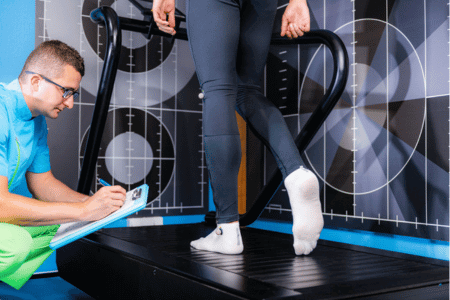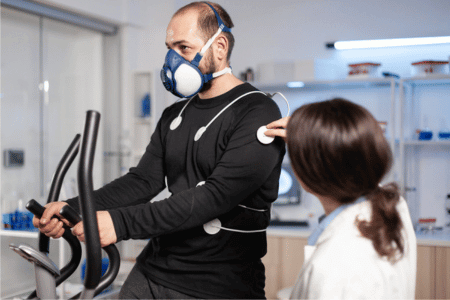
Discover the exciting world of biomechanics and the diverse career opportunities that await those who pursue a degree in this interdisciplinary field.
The World of Biomechanics Awaits
Welcome to the exciting world of biomechanics, where science, sports, and human movement collide. If you’ve ever wondered what jobs you can get with a biomechanics degree, prepare for an exciting journey that will open your eyes to limitless possibilities.
Why a Biomechanics Degree is Your Ticket to a Thrilling Career
A biomechanics degree opens up possibilities for those fascinated by the complex interaction between the human body and the physical world. The skills and knowledge you gain will make you highly sought after by employers in various industries, from sports and healthcare to engineering and research.
With a biomechanics degree, you can earn a competitive salary and have the opportunity to impact people’s lives significantly. Whether you’re helping athletes achieve their personal best, creating life-changing technologies for individuals with disabilities, or improving workplace ergonomics to enhance productivity, a biomechanics career can be financially and personally rewarding.
What You Need to Know About the Field of Biomechanics
Biomechanics is an interdisciplinary field that combines principles of physics, engineering, and biology to study and understand the complexities of human movement. The applications of biomechanics are vast and varied, from how our muscles and joints work in harmony to propel us forward to the optimization of sports performance and the development of advanced prosthetics.
Top Careers in Biomechanics: Where Your Degree Will Take You
Discover the career paths that await you with a biomechanics degree and how you can impact various industries.

1. Sports Scientist: Unleash the Champion in Every Athlete
As a sports scientist, you’ll help athletes reach their full potential by analyzing and optimizing their performance using cutting-edge technology.
The Role of a Sports Scientist in Elite Performance
Sports scientists are the unsung heroes behind the scenes of elite athletic performance, working tirelessly to ensure athletes reach their full potential. By leveraging their expertise in biomechanics, they analyze and optimize every aspect of an athlete’s performance, from their running technique to their nutrition and recovery strategies. They employ cutting-edge tools and techniques, such as motion capture systems, force plates, and wearable technologies, to scrutinize every detail of an athlete’s movement, identifying inefficiencies and potential areas for improvement.
In addition to enhancing performance, sports scientists play a crucial role in injury prevention. By understanding the biomechanical stressors placed on an athlete’s body during competition and training, they can develop targeted interventions that minimize the risk of injury and keep athletes competing at their best for longer. Collaborating closely with coaches, trainers, and medical professionals, sports scientists develop personalized training programs that balance pushing the limits and maintaining athlete health.
As a sports scientist, you can expect to work in various settings, from professional sports teams and national governing bodies to sports academies and research institutions. The median annual salary for sports scientists is around $83,281. Still, with experience and a proven track record of success, you can expect to earn significantly more, primarily if you work with high-profile athletes or organizations. In short, the role of a sports scientist in elite performance is as diverse as it is rewarding, allowing you to apply your biomechanics knowledge and passion for sports to help athletes achieve their dreams and inspire future generations.
What it Takes to Excel in Sports Science
To excel as a sports scientist, you’ll need strong analytical skills, a deep understanding of human movement, and the ability to communicate complex information to athletes and coaches effectively.
Biomechanical Engineer: Innovating Prosthetics and Exoskeletons
Biomechanical engineers develop innovative devices and technologies that improve the lives of individuals with disabilities or injuries.

The Intersection of Engineering and Biomechanics
The exciting field of biomechanical engineering brings together the best of both worlds: the power of engineering and the intricacies of biomechanics. As a biomechanical engineer, you’ll have the opportunity to design and develop cutting-edge devices, such as prosthetics, exoskeletons, and other assistive technologies, that can drastically improve the quality of life for countless individuals. With a biomechanics degree, you’ll be well-equipped to tackle this profession’s unique challenges, using your knowledge of human movement and mechanics to inform your designs and create life-changing solutions.
Collaboration is a crucial aspect of this profession, as biomechanical engineers frequently work hand-in-hand with medical experts, sports therapists, and even athletes to ensure their creations meet the specific needs of their users. From developing state-of-the-art prosthetic limbs that enable amputees to regain their mobility to creating exoskeletons that assist individuals with physical disabilities, the work of a biomechanical engineer has had a profound impact on the lives of many. With the rapid advancement of technology, the possibilities in this field are virtually limitless, providing an exciting and rewarding career path for those with a passion for engineering and biomechanics.
As a biomechanical engineer, you can earn a median annual salary of around $97,410. However, with experience, dedication, and a track record of successful innovations, there is potential for significant salary growth in this highly competitive field. What jobs can you get with a biomechanics degree? If you’re interested in blending your love for engineering and biomechanics, a career as a biomechanical engineer offers endless opportunities to make a meaningful difference in people’s lives while pushing the boundaries of technology and human performance.
Changing Lives with Cutting-Edge Technology
Biomechanical engineers enable individuals to regain mobility, independence, and improved quality of life by creating advanced prosthetics and exoskeletons.
Ergonomist: Enhancing Performance and Comfort in the Workplace
Ergonomists optimize the design of workspaces, tools, and equipment to improve productivity and worker well-being.

Why Ergonomics Matter in Modern Work Environments
In today’s fast-paced world, the importance of ergonomics in modern work environments cannot be overstated. As more and more people spend long hours at their desks or performing repetitive tasks, the risk of work-related injuries and discomfort increases. This is where ergonomists come in: these professionals use their knowledge of biomechanics to create workspaces and workflows that promote comfort, health, and efficiency, ultimately benefiting employees and employers alike.
Ergonomists understand that a well-designed work environment can reduce work-related injuries such as carpal tunnel syndrome, back pain, and other musculoskeletal disorders. By assessing and modifying workspaces, tools, and processes, they ensure that employees can work comfortably and safely, leading to improved job satisfaction and overall well-being. Moreover, a healthy and comfortable workforce is more likely to be productive, which can significantly impact a company’s bottom line.
As an ergonomist, you can expect a median annual salary of around $80,636. However, with experience and a demonstrated ability to improve workplace conditions, this field could grow in compensation. If you’re passionate about using your biomechanics degree to make a real difference in the lives of countless workers, a career in ergonomics offers the perfect blend of challenge, impact, and reward. As modern work environments evolve, the demand for skilled ergonomists is only set to increase, making it an excellent choice for those looking to make a difference with their biomechanics degree.
The Skills Needed to Become a Successful Ergonomist
A successful ergonomist possesses a strong understanding of biomechanics, human factors, and engineering principles. Excellent communication, problem-solving, and observational skills are also essential, as they must work with various stakeholders to develop and implement ergonomic solutions.
Additional Opportunities: Expanding Your Horizons with a Biomechanics Degree

Explore more career paths that can be pursued with a biomechanics degree and unlock your potential in diverse fields.
Rehabilitation Specialist: Helping Athletes Bounce Back
Rehabilitation specialists use their biomechanics expertise to create customized recovery programs for injured athletes. They collaborate closely with medical professionals to help athletes regain strength, mobility, and performance. The median annual salary for rehabilitation specialists is around $37,189.
Clinical Biomechanist: Optimizing Human Movement for Health
Clinical biomechanists focus on evaluating and improving human movement in clinical settings. They work with patients recovering from injuries or living with chronic conditions to enhance their quality of life. The median annual salary for clinical biomechanists is around $53,997.
Biomechanics Researcher: Pushing the Boundaries of Human Performance
Biomechanics researchers work in academic or industry settings, investigating the principles of human movement and applying their findings to advance the field. They contribute to developing new technologies, products, and techniques to enhance human performance. The average annual salary for biomechanics researchers is around $90,000.
Getting Your Foot in the Door: How to Land Your Dream Job in Biomechanics
Learn the essential steps to kickstart your career in biomechanics and land your dream job in this competitive field.

Network Like a Pro: Making Connections That Matter
Attend conferences, workshops, and events related to biomechanics to build a solid professional network. Engage with industry professionals, researchers, and academics to forge connections leading to job opportunities and collaborations.
Build Your Portfolio: Showcasing Your Expertise
Create a portfolio highlighting your skills, knowledge, and experience in biomechanics. Include examples of your work, such as research papers, presentations, or case studies, to demonstrate your expertise and passion for the field.
Ace the Interview: How to Impress Potential Employers
Prepare for interviews by researching the company and the role, practicing common interview questions, and showcasing your enthusiasm for biomechanics. Be ready to discuss your experiences and accomplishments in detail and explain how your skills can contribute to the organization’s success.
Conclusion: Unleashing the Power of Your Biomechanics Degree
A biomechanics degree offers a diverse range of career paths, enabling you to combine your passion for human movement, sports, and science to make a lasting impact on people’s lives. Transform your love for biomechanics into a rewarding and fulfilling career by exploring various job opportunities.
The Journey Begins: What Jobs Can You Get with a Biomechanics Degree?
Now that you have a clearer understanding of the exciting careers available with a biomechanics degree, it’s time to embark on your journey and unlock your potential in this fascinating field. To maximize your opportunities and access exclusive job openings in the sports industry, consider signing up for a Jobs in Sports membership today.
With a Jobs in Sports membership, you’ll gain access to a vast network of professionals, job postings, and invaluable resources to help you land your dream job in biomechanics. Take advantage of the chance to connect with like-minded individuals and potential employers in your field. Our platform is designed to give you a competitive edge and open the door to opportunities in sports-related careers.
Are you ready to take the next step toward a fulfilling career in biomechanics? Join Jobs in Sports now and unlock the full potential of your biomechanics degree. It’s time to turn your passion into a rewarding profession and make a lasting impact in the world of sports.





